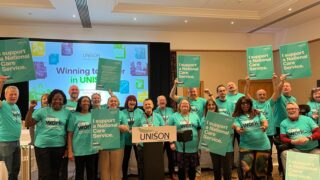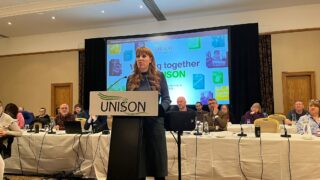- Conference
- 2024 National Community Conference and Seminar
- Date
- 16 November 2023
- Decision
- Carried
Conference notes that in February 2022, following recommendations from the Migration Advisory Committee, the United Kingdom (UK) government made it easier for overseas social care staff to work in the UK.
Home Office data (cited by the Migration Observatory) shows that in the year up to June 2023, 77,700 long-term work visas were granted to care workers – a six-fold increase from 12,300 in the year ending June 2022.
Additionally, in the year ending June 2023 Health and Care made up 64% (per cent) of main applicants in the Skilled Worker Route.
In 2022, 99% of care workers sponsored for visas were from non-European Union countries, predominantly India, Zimbabwe, Nigeria and the Philippines.
Many of these workers are potentially UNISON members and many of these migrant workers may also be Black members working within the Community Service Group.
Care worker and care assistant roles were added to the ‘shortage occupations list’, which meant that – if they could find a UK -based organisation willing to sponsor them – workers could be granted visas for relatively low-paid roles.
Under the rules, health and care workers must be sponsored by an individual employer, which their visa is then “tied” to. This system leaves workers dependent on their employer for the right to work in the UK, making it difficult for them to switch jobs
and less likely to speak out if things go wrong with their employer for fear of repercussions.
This “tied” visa system in the UK care sector, potentially leaves Community migrant workers at risk of exploitation and abuse.
This system not only potentially affects members in social care within the Community Service Group but our colleagues in other sectors.
As the Kings Fund points out, even with the new recruits from overseas, 9.9% of social care jobs were vacant in 2022/23, only marginally better than the 10.6% vacancy rate in 2021/22.
Conference welcomes the work that the Service Group Executive has undertaken to date to call for a National Care Service which values all its employees equally whether UK citizens or migrant workers.
Conference further welcomes the initiative taken by UNISON to welcome new social care members at the point of joining through its successful online training and development events as part of its over-arching social care strategy.
However, Conference is concerned that whilst UK citizens who work in social care in Community continue to experience poverty wages and unreasonable demands through their working terms and conditions the situation is far more dire for our counterparts that join us from overseas via the ‘shortage occupation list’ who may fear reprisal and the potential loss of both their employment and visa status should they legitimately raise concerns in the workplace.
Conference believes this fear is well-placed, as evidenced by the increasing media reports regarding the experiences of overseas social care workers that enter employment in the UK via this route.
Conference believes that the Community Service Group Executive has a role to play in highlighting both the continuing parlous state of social care and the issues that face our overseas colleagues who join us to work in Community in the Social Care sector.
Conference therefore calls on the Community Service Group Executive to:
a)Work with the National Executive Council (NEC), and other appropriate stakeholders to identify the effects that the Skilled Worker visa is having on the working lives of social care members in Community.
b) Highlight the issues faced by UNISON Community members who experience problems as a direct result of the ‘tied’ visa system though all appropriate media.
c) Work with regions and branches to ensure that Community social care members are signposted to appropriate UNISON support to challenge unfair working practices, treatment and pay as a result of their visa status.
d) Continue to promote the assistance of the UNISON/Joint Council for Welfare of Immigrants helpline for those members who experience problems as a direct result of their visa status.
e) Ensure that the issues relating to Community social care members on ‘tied’ visa conditions are reflected within UNISON’s campaigning for a National Care Service



